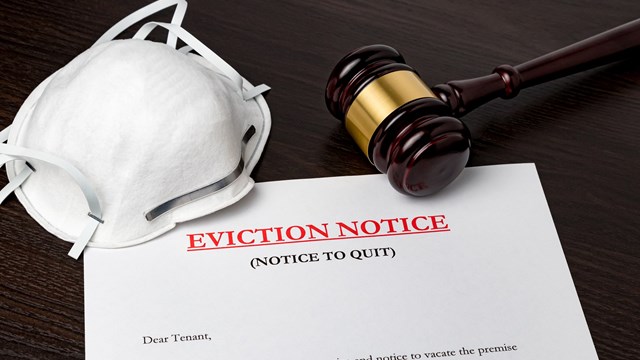
In a high-cost, high-density real estate landscape like New York City, when disputes arise in a multifamily building, tensions can escalate from annoyance to litigation very quickly. In rental buildings, problems can range from lack of maintenance and upkeep to rent payment default or destruction of property. In co-ops and condos, residents’ status as shareholders within a cooperative corporation or owners of real property that just happens to be cheek-to-cheek with other property changes the game a bit, but problems like noise and simmering disputes with neighbors are perennial issues.
With the differences inherent in the world of renters versus that of shareholders and unit owners, it makes sense that the Civil Court of the City of New York would have its own Housing Part. In 1997, on the 25th anniversary of the founding of that court, New York State’s then-Chief Judge Judith Kaye announced a top-to-bottom overhaul of the court, according to The New York Times. As part of that reorganization, a special Cooperative/Condominium Resolution Part of the Housing Court was created. Thousands of issues and cases have been resolved in that court in the nearly 10 years since it first opened its metaphorical doors.
A Place of Their Own
Before the creation of the Co-op and Condo Part of the Housing Court in the late 1990s, disputes between shareholders and co-ops were directed into the same litigation stream as renters and building owners. John Van Der Tuin, a partner in the law firm of Balber Pickard Battistoni Maldonado & Van Der Tuin LLP in Manhattan, has experience with both rental and shareholder cases and believes the separate court was necessary because “the dynamics and legal issues are so different.” He adds, “It’s a different economic relationship. With a co-op, it’s not just a space rental—it involves partial ownership. The breadth and depth of the relationship is different.”
Before the separate court, even the logistics of trying a case could prove challenging. “First, there was just a huge volume of landlord/tenant cases. You just got lost in it,” Van Der Tuin says. “It was difficult for any judge to give a case quality attention. When you have someone’s home on the line, that becomes a problem.”
Despite the fact that the court will try cases involving condominiums, few such disagreements actually come before a judge—again because of the status of ownership. “In most cases, condos can’t use the housing courts,” says Al Pennisi, a partner in the law firm of Pennisi Daniels & Norelli, LLP in Rego Park, and president of the Federation of New York Housing Cooperatives & Condominiums (FNYHC). “Each owner has the deed to each of his or her own unit. If an association does want to bring legal action against a unit owner, they have to go to the state Supreme Court, which is our trial court.”
That’s not something that happens too often, in large part because “the process costs 20 times more than the housing court,” says Pennisi. “These are full-blown cases.” Also, in housing court, a case can take as little as a month to be decided. Going to trial court with a condo case could take months or years to resolve.
The condominium cases that do make their way to housing court usually involve individuals renting or subletting a condo unit from the principal owner. In those instances, it’s a basic tenant-landlord dispute, which most often would go to the regular housing court, not the co-op/condo part.
Solving Disagreements
The vast majority of co-op cases entering the housing court system involve common issues such as noise and objectionable tenants. Even something as seemingly mundane as persistent odors emanating from an apartment can create enough trouble within a building to force an issue or lead to the eviction of a shareholder. “There are very few issues with things like not paying common charges,” Pennisi says. “People don’t want to lose their homes, so they tend not to fall behind on things like that.”
Which means that the vast majority of issues boil down to a desire by shareholders to rid the building of a fellow tenant because of some objectionable or unpleasant behavior. If the shareholder does not respond positively to requests that he or she change or fix the behavior, the board could bring charges against the individual and hold a shareholder vote.
Depending on the individual building’s bylaws, it takes either 51 percent of the shareholders or two-thirds of the board to decide that resident is objectionable and force him or her to leave the building. In most cases, the person voted out does not have much recourse because “By signing the proprietary lease, you have agreed that these people — your fellow shareholders—are your legislature,” Pennisi says. But, he adds, there has to be due process, meaning the shareholder in question must be informed of meetings and votes. No one can be evicted in secret.
Clarifying the differences between co-ops and condos, Pennisi adds, “You can’t do this in a condominium. [The board] would have to go to court and get a court order. You can’t do it by vote of a board alone.”
For co-op cases, the lawsuits that make their way to the New York City housing court usually involve issues regarding the removal of the shareholder and whether the action was warranted. In many instances, because of the specifics of the co-op’s bylaws, the courts will determine that the judgments of the shareholders will prevail. The real issue, usually, is in determining that the board did nothing illegal or outside the purview of the by-laws in its ousting of the shareholder.
These issues specific to co-ops are where the expertise of a judge familiar with the intricacies of things like bylaws and the unique relationship between shareholder and co-op board becomes crucial. Although many of the Housing Court’s 50 judges have training in the particulars of co-op law, not every judge presiding over a co-op cases specializes in that particular arena.
Before the creation of the Co-op/Condo Part of the Housing Court, there were many lawyers “who didn’t realize that you can’t treat tenant-shareholders like other tenants,” Pennisi says. “These judges had a lot of expertise in housing laws, but co-ops are different.” Today, Pennisi says, the FNYHC works with a lot of different parties, including attorneys and the judges of the New York City Housing Court, to provide training and information on the unique world of co-ops and shareholders. “The courts have allowed us to do lectures for judges and attorneys,” he says. “There’s been a lot of training going on.” And Pennisi says it’s doing a lot of good.
Pennisi also adds that legislation in support of co-ops has helped bridge the knowledge gap. “Laws have been amended and changed,” he says. Especially in the last ten years, there has been a movement to clarify the distinctions between co-op disputes and general landlord-tenant issues.
Healthier Alternatives
Despite the existence of a separate court to handle co-op cases, the number of disputes that make it to the court is still relatively low in comparison to the enormous number of co-op owners who call New York City home. “There are economic disincentives to going to court,” says Van Der Tuin. “It’s an expensive process.” In fact, if the instigator of the case loses, they are responsible for the cost of all the legal fees, including those of their opponent.
“And it’s still not a good process for resolving disputes,” Van Der Tuin adds. That is especially true considering that many of these cases will end with the shareholder in question still living among the neighbors who brought the complaint against him or her in the first place. The legal process does nothing to assuage grievances, and instead can aggravate them further.
Arbitration and mediation are alternative dispute resolution options that many attorneys swear by to avoid the expense and acrimony of going all the way to court.
According to James Samson of the Manhattan-based law firm Samson Fink & Dubrow LLP, “There are some really good arbitration and mediation panels, and some of them have a section geared just for condos. The last place you want to be is [court.] And these quality of life cases, the noise complaints, people decorating the hallways, secondhand smoke, these are disputes between neighbors—they don’t belong in court. [Better to] try to get the neighbors to sit down and talk to each other. All these quality of life cases you try to get mediated first. Some [mediation panels] claim that they have 75 percent success rate, which is pretty good. And most people want to resolve the dispute. They don’t really want to be obnoxious. It’s usually just a difference of opinion. [A mediator] will listen, they’re fair, they don’t have any agenda. And both sides perceive them to be fair. It’s an attempt to have both sides see the other side and hopefully curb their behavior.”
Whether through an attorney-brokered settlement or alternative dispute resolution, “The vast majority of these cases will be settled before they go to court,” Pennisi says. “If ten to 20 percent of cases get to court, that’s a lot.” Attorneys generally try to get their clients to sit down and discuss the issue and work with trained mediators to get to the root of the issue and solve the problem. “And even when the case goes to court, it’s usually settled before a judgment is made.” Even the most stubborn individuals tend to see the light when a legal decision looms before them. “It’s the moment of truth,” Pennisi says. “And in the end, people don’t want to get evicted.”
Thanks to New York State’s decision to create a separate court for co-ops and condos, thousands of shareholders, unit owners and boards have found a safe haven in which to resolve and settle conflicts in a way that factors in the specific attributes of their housing differences and needs. Judges and attorneys are taking years of experience and meshing them with an ever-increasing knowledge base regarding proprietary leases, bylaws and other intricacies unique to co-ops and condos. And new legislation is helping to clarify issues and disputes as they grow and evolve in an ever-changing world of real estate and home ownership. As difficult as legal disagreements can be, shareholders, unit owners and boards can find at least a modicum of relief in knowing that the New York City Housing Court is looking out for their needs.
Liz Lent is a freelance writer and a frequent contributor to The Cooperator.






5 Comments
Leave a Comment